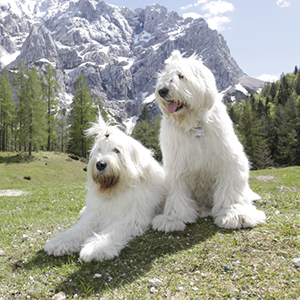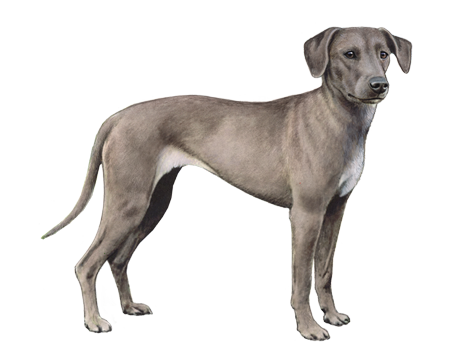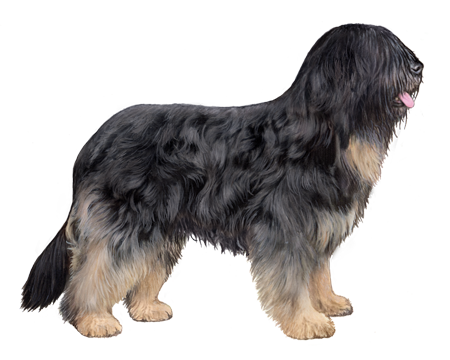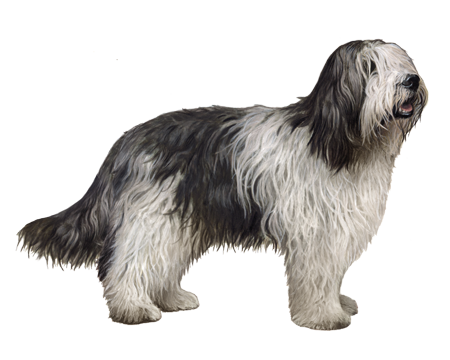
South Russian Ovcharka
The South Russian Ovcharka has many desirable traits. They are loyal and active with their people, and they can be great with children. On the other hand, this breed can also bore easily, tends to be independent, and can, if not properly socialized, show aggression towards strangers and other dogs. They tend to be possessive of their food, toys, and bed. Proper training and socialization from a young age is very important for this breed.
Interested in discovering if your dog is a South Russian Ovcharka?
Check out Wisdom Panel's DNA tests.

South Russian Ovcharka Traits
General Appearance
The South Russian Ovcharka is a large dog with a fuzzy, shaggy appearance.
Coat and Coloring
The South Russian Ovcharka has a furry undercoat with a long topcoat, the texture of which is similar to that of a goat. They are usually white, although it’s not uncommon for them to also have grey, beige, or white with grey marks.
Distinctive Physical Traits
Of the three Ovcharka breeds, the South Russian Ovcharka’s coat, above, sets it apart from the others.
South Russian Ovcharka Temperament
This dog is loyal and energetic, easygoing, and protective of the people they know and love. They are confident and fearless—which can sometimes get them into trouble—but they’re always up for a good time.
On the other hand, the South Russian Ovcharka’s protective instincts often make them wary of, and sometimes even aggressive towards, other dogs and people that they don’t know. They can become possessive of their things if they aren’t properly trained, and training can sometimes be difficult because they tend to be stubborn and headstrong.
A well-socialized and well-trained South Russian Ovcharka can overcome these traits, but will always have a certain impulse to guard and protect.


South Russian Ovcharka History
The origins of the Slovakian Ovcharka are presently obscure. While some experts believe that these dogs actually had their start in Europe and became well-known after immigrating to Russia, others believe that the dog was born and bred in Russia and nowhere else. Whatever its origins, the breed was originally used to herd and protect sheep, although it has become more of a household dog over the years. Even though they aren’t predominantly used as sheepdogs anymore, Slovakian Chuvachs still do best in a large area where they can explore and run.
South Russian Ovcharka Care
Nutrition
South Russian Ovcharkas require a high-quality dog food that is age-appropriate—whether it’s commercially manufactured or homemade (with a veterinarian’s supervision and approval). It’s important to monitor the amount of food you give your South Russian Ovcharka. Reduce the portions or restrict calories if your pup gains weight.
Your veterinarian is always a good source to help provide you with appropriate nutrition and feeding guidelines.
Grooming
The South Russian Ovcharka has a long coat that’s fairly demanding in terms of maintenance. They shed moderately between their high shedding season (traditionally in the spring), and require daily brushing and combing to keep their fur free of mats. They also have a tendency to get pretty dirty when playing outside, so the occasional bath is necessary.
All dogs require regular dental care, including at-home teeth brushing and professional dental cleanings, and the South Russian Ovcharka is no exception. Maintaining good dental hygiene is important for their overall long-term health.
Exercise
A proper exercise routine is essential to keep this breed happy, healthy, and behaved. They are a high-energy dog that does best with lots of space to run and play, although it’s important to always keep this breed on a leash or in a fenced-in, secure area. Plan for a little over an hour of daily exercise—including walking or running, throwing a ball, or playing Frisbee—to keep them happy and healthy.
Training
The South Russian Ovcharka is known to be stubborn and hardheaded, and they often require professional training. The proper training is essential for this breed, though, since they can be wary and aggressive towards unknown people and animals, and they can bore easily.

Breed Group
Herding
The herding group is a diverse category. These highly intelligent breeds were developed to guard and control the movement of livestock.


































































